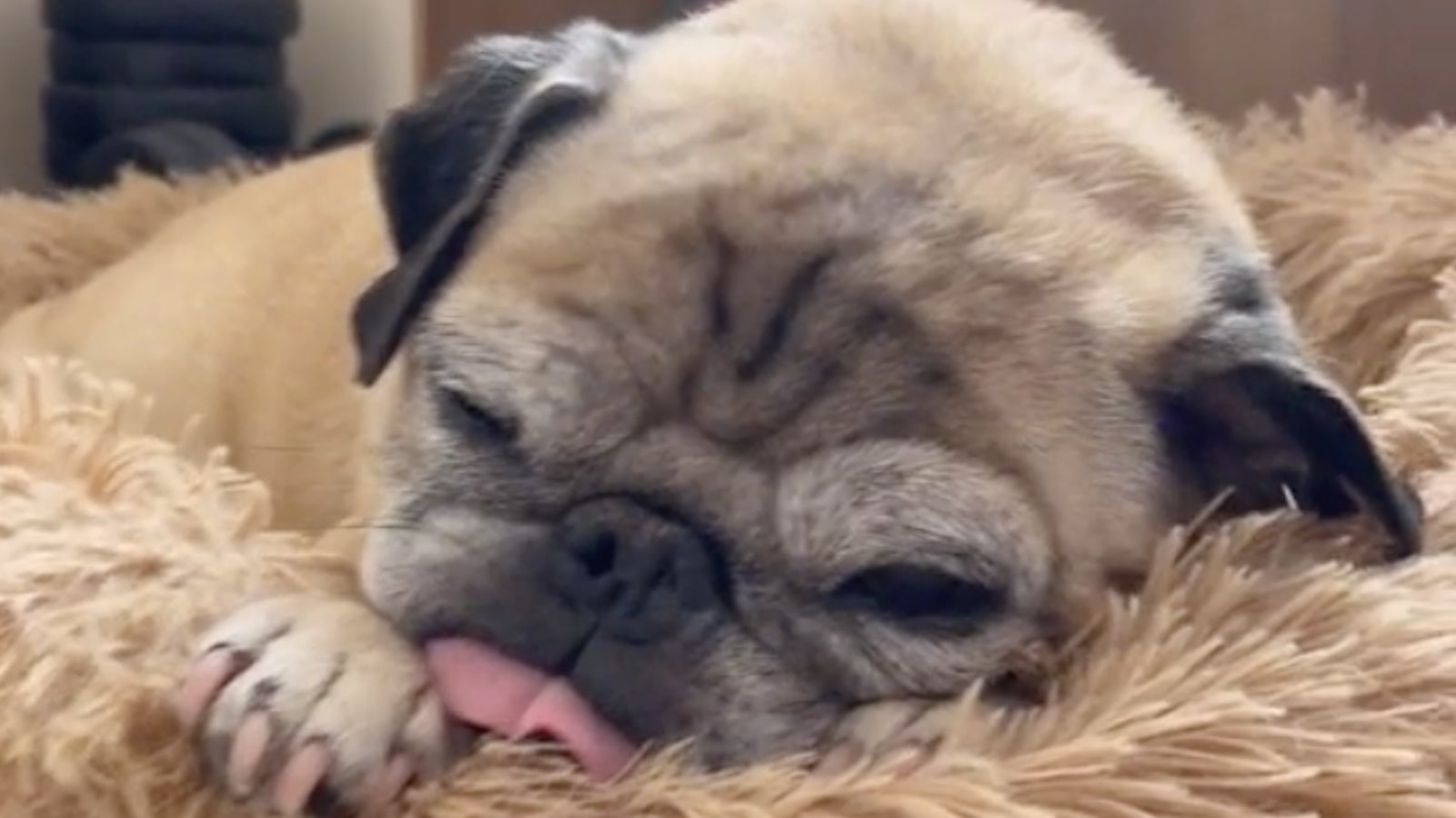A TikTok-famous elderly pug is a mascot for the burned-out masses
If you want to embody the spirit of Noodle the pug, know that it’s perfectly acceptable to work from home in your sweatpants instead of dragging yourself to the office. Maybe take Monday as a personal day, too.


If you want to embody the spirit of Noodle the pug, know that it’s perfectly acceptable to work from home in your sweatpants instead of dragging yourself to the office. Maybe take Monday as a personal day, too.
That’s the Noodle approach to life on no-bones days, anyway.
The Noodle in question is a 13-year-old pug owned by Jonathan Graziano, a social media manager who has rocketed his adorably droopy pet to TikTok stardom. One recent video of Noodle has accumulated upwards of 11 million views, and the pug has been featured everywhere from NBC’s Today show to the New York Times.
What’s a “bones day”?
Noodle is best-known for his productivity-forecasting abilities. In most videos, Graziano checks whether Noodle “woke up with bones” by kneeling over the dog’s bed, pulling Noodle up into a sitting position, and then releasing him.
Most days, Noodle flops right back down, a dead weight. That’s the sign for a “no-bones day,” which Graziano tells the Times are “days where you just need to be very kind to yourself, sensitive of others, wear your sweatpants, take a bubble bath, self-care.”
On a rarer “bones day,” Noodle will remain sitting up, majestic in his canine structural integrity. On one such recent celebratory occasion, Graziano advised the world, “You’ve got to treat yourself today. The Japanese fried chicken you were gonna order for lunch—get the curry to dip it in. All those festive gourds? Buy ’em! That raise you deserve but haven’t asked for yet? You totally deserve it, ask for it!” On bones days, we carpe diem.
How Noodle captures our cultural zeitgeist
There are plenty of obvious reasons for Noodle’s internet stardom. Graziano is funny, and Noodle is a chubby little pug whose tongue sometimes sticks out for no reason. What more could you want?
But Noodle’s videos also speak to a cultural moment, in which many people are burned out and ready to reevaluate their relationships with productivity and ambition.
Chinese youth are embracing the “lying-flat movement,” which advocates slacking off at work and rejecting traditional employment as a form of political rebellion. In the US, career skepticism is taking root, as people weigh whether the payoff of killing themselves for a job (maybe being able to afford to buy a house one day?) is really worth the trade-offs in mental and physical well-being. Meanwhile, the stress and fear of the pandemic has a lot of working parents at a breaking point.
All of which is to say: Many of us are ready to flop over, just like Noodle. We recognize ourselves in a grizzled pug who refuses the tyranny of sitting up, whether or not we can afford to actually follow his lead. And Graziano’s framing of no-bones days as a time for self-care is just the message that a lot of people need to hear. “If it’s a no-bones day, I just stay in bed / Noodle said it’s fine if I don’t get dressed,” one young woman sang in a fan video. “Noodle said that it was quite all right / If I don’t leave my house all night.”
While Noodle’s no-bones mindset is timely, he is far from the first icon to inspire the masses with a certain stubborn languidness. The Sanrio character Gudetama, a “lazy egg” often found being crankily dragged from his shell-home by a pair of chopsticks, became particularly popular among millennials “as a reaction against the societal pressure—to work harder, work longer, do more—that runs deep in Japanese culture,” as Amelia Schmidt wrote for Quartz.
And the enduring popularity of Herman Melville’s short story Bartleby, the Scrivener can be attributed to the titular character’s startling defiance in the face of the world’s mundane demands. His constant refrain—“I would prefer not to”—doesn’t serve him particularly well in the story. He winds up going to prison and dying. But as Leah Fessler wrote, Bartleby is also a kind of perverse hero for overachievers, a reminder of the power that can come with saying no.
That’s just the power that Noodle holds. “If Noodle didn’t want to do something, Noodle’s sure as hell not going to do it,” Graziano told Slate.
Bones days and the power of hope
Noodle’s frequent bonelessness may be liberating, but his bones days are just as important, and all the more valuable for their rarity. They remind us to take risks and push ourselves; they reassure us that there’s still reason for optimism (perhaps today will be a bones day, against the odds!) even in the midst of an incredibly difficult era.
A bones day, Graziano tells Slate, “is where you take the thing that I think you were putting off doing, or the thing you were scared to do, or you weren’t super motivated, and the bones day is the day you do it.”
These days, it may be too much to ask of ourselves to live every day like it’s bones day. But even the art of doing nothing can grow tiresome after a while. We need to hold out hope that we’ll feel motivated and energized eventually, even if we’re in a quiet period right now. We can certainly live some days with buoyancy and bones—particularly when Noodle tells us to.